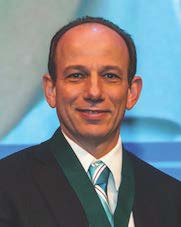Gregg Fields, Ph.D., Vice President for Research

Gregg B. Fields, Ph.D., earned bachelor’s and doctorate degrees in chemistry from the University of Florida and Florida State University, respectively, and was a postdoctoral scholar with Ken A. Dill, professor at the University of California at San Francisco.
Fields joined the faculty at the University of Minnesota in 1991 as an assistant professor. He was promoted to associate professor with tenure in 1995 and then achieved the rank of full professor of chemistry and biochemistry at Florida Atlantic University (FAU) in 1997.
In 2008, he became a Robert A. Welch Foundation Distinguished University Chair in Chemistry in the Department of Biochemistry at The University of Texas Health Science Center at San Antonio. Fields relocated to the Torrey Pines Institute for Molecular Studies in 2011, where he was a full member, vice president of Research, and Distinguished Chair of Metalloproteinase and Multiple Sclerosis Research.
He returned to FAU in 2014 as a full professor and chair in the Department of Chemistry and Biochemistry and the director of the Center for Molecular Biology and Biotechnology. In 2019, he was appointed executive director of FAU’s Institute for Human Health and Disease Intervention, and in 2021 he became the co-director of the Memorial Cancer Institute Florida Atlantic University Cancer Center for Excellence. Fields is also a courtesy professor in the Department of Chemistry at the Herbert Wertheim UF Scripps Institute for Biomedical Innovation and Technology.
The Fields research group has focused on extracellular protease-based diseases, with particular attention paid to tumor metastasis, arthritis, and neurodegenerative diseases. His research interests are in the use of chemical approaches to better understand how protein three-dimensional structures influence cellular and enzymatic behaviors. Chemical approaches were used to develop mini-protein models for the study of cellular recognition processes, which in turn allowed for the mapping of protein domains involved in cell binding and signal transduction. Mini-protein models were subsequently utilized to dissect the mechanisms of collagen catabolism, and in the process provided new avenues for protease inhibitor design.
Fields is also an elected Fellow of the National Academy of Inventors and the American Association for the Advancement of Science. He has authored or coauthored more than 300 scientific publications and has presented more than 190 invited lectures.